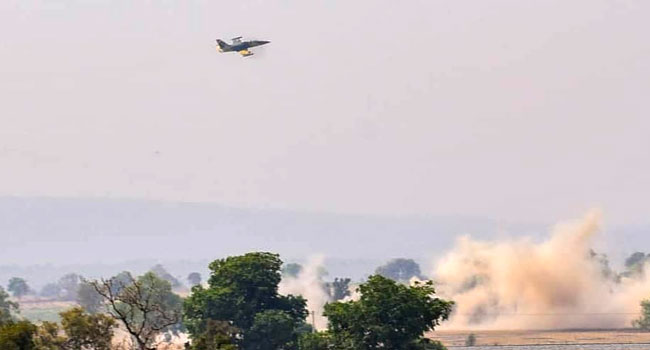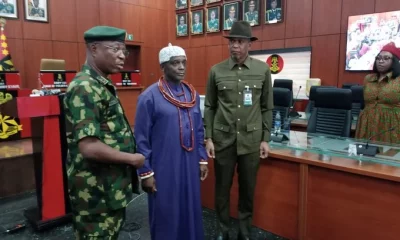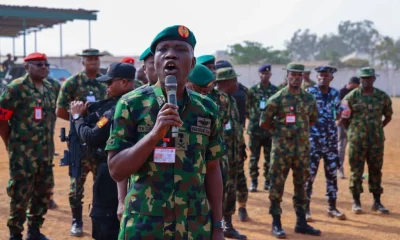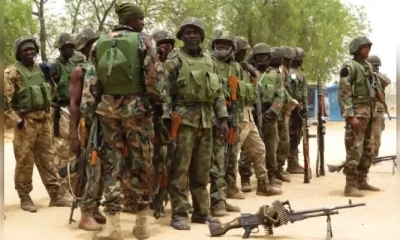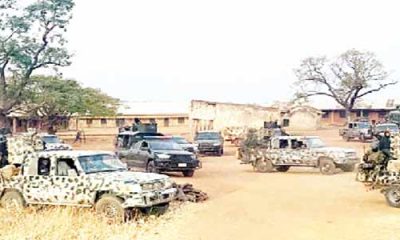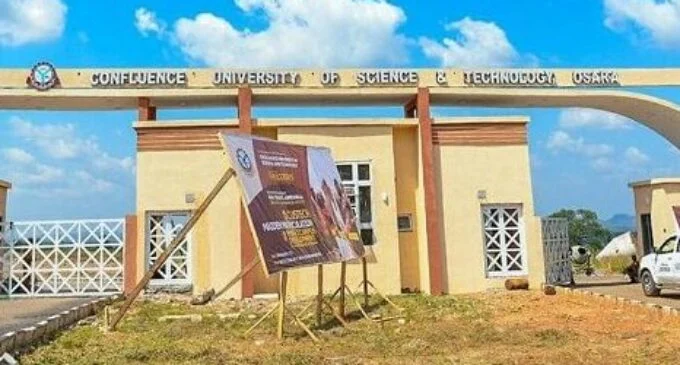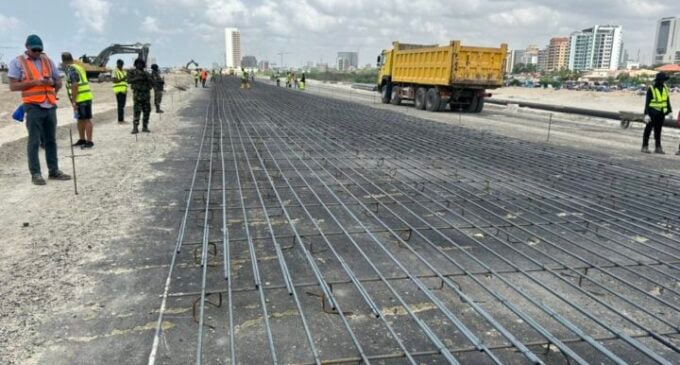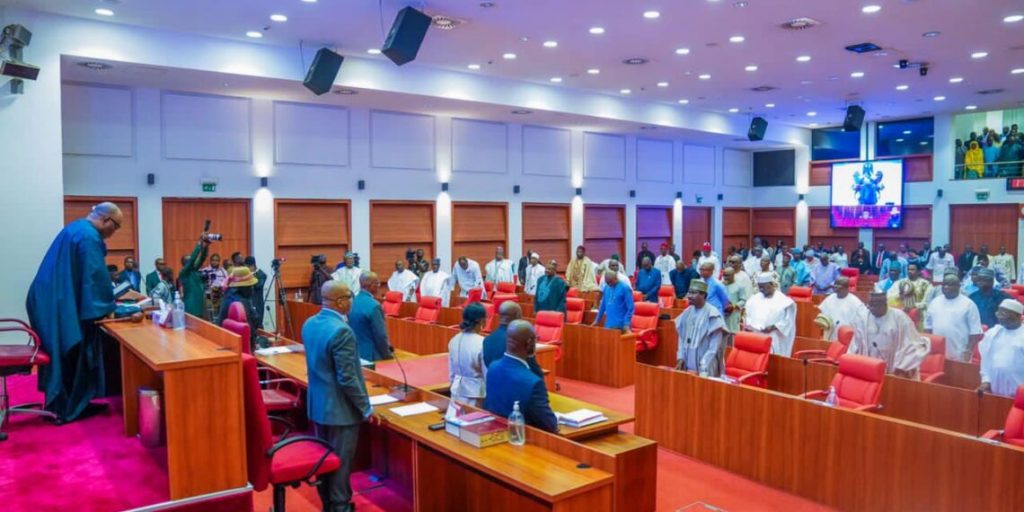The House of Representatives on Thursday resolved to probe the ongoing N15tn Lagos-Calabar Coastal Highway project.
The House said it would set up an ad-hoc committee, which would investigate the project and submit a report within four weeks.
The resolution of the House followed the adoption of a motion of urgent public importance moved during plenary by the member representing Gwer East/Gwer West Federal Constituency, Benue State, Mr Austin Achado.
The House also resolved to summon the Attorney-General of the Federation and Minister of Justice, Lateef Fagbemi, SAN; the Minister of Finance, Wale Edun and his works counterpart, David Umahi, to shed more light on the project.`
But the Ministry of Works defended the project, saying it followed due process. It also said the House of Representatives members had pledged support for the project.
A 700-kilometre turnpike infrastructure, the coastal highway project has attracted commendation and condemnation since the Bola Tinubu administration approved it in February.
The 10-lane coastal road was designed to connect Lagos to Cross River, passing through Ogun, Ondo, Delta, Bayelsa, Rivers, and Akwa Ibom states before culminating in Calabar, the Cross River State capital.
The project gained traction under the administrations of Goodluck Jonathan and Muhammadu Buhari but could not commence.
Under Jonathan, the highway was to cost $12bn, and $11.1bn under Buhari. It was subsequently expanded from a four-lane double carriageway to a 10-lane highway.
Minister of Works, Dave Umahi, disclosed that the construction of the coastal road was expected to span eight years and cost N4bn per kilometre.
FEC approval
So far, the minister disclosed that the Federal Executive Council had approved and released N1.06tn for the contractor for the pilot phase of the construction, which started at the Eko Atlantic City and will terminate at Lekki Deep Seaport.
Minister of Works, Dave Umahi
Although many have lauded the ambitious project, others faulted the process of the award of the contract that led to the emergence of Hitech Construction Company Nigeria Limited as the preferred contractor.
Umahi had explained that the reason for awarding the contract to Hitech without competitive bidding as laid down by the laws was because of the company’s “track record.”
The minister disclosed that the highway was conceived as an Engineering, Procurement and Construction plus Financing project.
The model, he explained, entails part-funding by the Federal Government between 15 to 30 per cent.
Umahi said the approval process went through the Bureau of Public Procurement after consideration by the Federal Executive Council as prescribed by law.
The minister also said that the contract was awarded on a counterpart-funding basis and not on a public-private partnership, as widely claimed.
“Under this model, the investor provides all designs, part of the financing and construction while the Federal Government provides the counterpart funding. The ministry received such a bid, worked on it and sent it to BPP.
“The BPP worked on it according to the Procurement Act and came up with a price slightly lower than the ministry’s price and even lower than the cost of similar projects awarded five years ago like the Bodo-Bonny project.
Counterpart funding
“So, there’s a marked difference between PPP and EPC plus F (Engineering, Procurement and Construction plus Finance). And in this particular project, there will be a negotiated counterpart funding of between 15 and 30 per cent. We are still negotiating on these terms and will come to a resolution soon,” the minister stated.
Aside from the cost, the demolition of structures along the right of way of the project, particularly the hospitality outlets around the Lagos beaches, had sparked public discourse on the project.
The government has commenced payment of compensation to some of the businesses affected by the demolition.
The first phase of the compensation flag-off included 10 property owners who had been paid about N2.75bn.
However, moving the motion on the floor of the chambers, Achado, a chieftain of the All Progressives Congress, insisted that the guarantees issued to cover the debt financing component of the project did not have the approval of the National Assembly.
He stated, “It is disturbing that the contingent liabilities accruing to the Federal Government of Nigeria on this project violate the Debt Management Office (Establishment) Act of 2023, as section 22(3) states that the minister shall not guarantee an external loan unless the terms and conditions of the loan shall have been laid before the National Assembly and approved by its resolution.
“The guarantees issued to cover the debt financing component of this project do not have the approval of this National Assembly.”
The lawmaker noted that the Federal Ministry of Works had executed an engineering procurement construction finance contract in favour of Hitech Construction Company Nigeria Limited for the delivery of the coastal road and rail project.
He explained that the project was estimated at N4.33bn per kilometre using reinforced concrete technology for a carriage width of 59.7 metres, to include 10 lanes, shoulders and rail with additional designs of service ducts, street lights, drainages and shore protection.
Achado further said the project had the prospect of providing easy access for the movement of goods and services across the nation, and has a financing structure, as announced by the works minister, “Which requires the Federal Government to provide 15 per cent to 30 per cent co-financing, while the private sector counterpart will provide the balance, and toll the road when completed for a minimum period of 15 years, to ensure full recovery of all debts and equity applied for the delivery of the project.”
Procurement process
Regrettably, Achado maintained that the procurement strategy of the project might have violated section 40(2) of the Public Procurement Act 2007.
The section, he added, required that where a procuring authority adopts a restrictive tendering approach, “It should be on the basis that the said goods and services are available only from a limited number of suppliers and contractors and as such, tenders shall be invited from all such contractors who can provide such goods and services.”
Furthermore, the lawmaker argued that the procurement strategy adopted by the Federal Ministry of Works for the award of the contract violated the Infrastructure Concession and Regulatory Commission Act 2905.
“Section 4 of the Act outlines that all approved infrastructure projects and contracts for financing, construction and maintenance must be advertised for open competitive public bid, in at least three national dailies,” Achado noted, adding that section 5 of the Act further clarified that “Any direct negotiations with only one contractor could be allowed, only after exhausting the provisions of section 4.”
He further raised the alarm of a possible creation of contingent liabilities for Nigeria because, according to him, while promoting the project, the ministry of works provided a rate per kilometre for the planned works but failed to provide the private partners’ financing sources, structure and competitiveness.
However, Uyime Idem (PDP, Akwa-Ibom), moved an amendment for the project to be referred to the Committee on Public Procurement, which he heads.
He explained that his committee already received several petitions on the project. His amendment was subsequently adopted by the House.
Isiaka Ibrahim (APC, Ogun) moved an amendment for the House Committee on Works to be included. The amendment was also adopted.
The committees were then directed to summon Umahi, Edun and Fagbemi, to ensure that all guarantees and credit enhancement instruments for the Lagos-Calabar Coastal Road Project are sent to the National Assembly for approval.
When the motion was put to a vote by Speaker Abbas Tajudeen, after the motion was amended, the majority of the members voted in support.
Following the adoption of the motion, Achado said, “The House resolved to set up an ad hoc committee to investigate the procurement process of the contract for the Lagos-Calabar Coastal Highway project and report to the House within four weeks.
“The House called on the Honourable Minister of Works, the Honourable Minister of Finance and the Attorney-General of the Federation and Minister of Justice to ensure that all guarantees and credit enhancement instruments for the Lagos-Calabar Coastal Road Project are sent to the National Assembly for approval.”
In an interview with The PUNCH, the Deputy Spokesman for the House, Philip Agbese, disclosed that the ad hoc committee would be set up soon at the discretion of the Speaker, Abbas Tajudeen.
He said, “The House has its rules change concerning the setting up of ad-hoc committees. Very soon, the committee will be constituted at the discretion of the speaker, taking into consideration the prayers of the motion.
“The minority will send a representative and all the various caucuses would be allowed to have a say in the committee,” Agbese clarified.
In his reaction to the House resolution, the works ministry’s spokesperson, Ben Goong, recalled that the National Assembly members conducted a site visit at the beginning of the construction and granted full approval for the project.
He further mentioned that they expressed support for the project and committed to ensuring its timely completion.
He said, “But members of the National Assembly paid a visit to the site at the start of constructing the highway. The minister was accompanied by the leadership of the house committee on works and they pledged to support that project till it was completed.”
The Director of Press and Public Relations, Ministry of Finance, Mr Mohammed Manga, declined to comment on the lawmakers’ demand for guarantees and credit enhancement.

 News3 years ago
News3 years ago
 Entertainment2 years ago
Entertainment2 years ago
 News3 years ago
News3 years ago
 Privacy3 years ago
Privacy3 years ago
 Sports2 years ago
Sports2 years ago
 Entertainment2 years ago
Entertainment2 years ago
 News3 years ago
News3 years ago
 Opinion3 years ago
Opinion3 years ago
